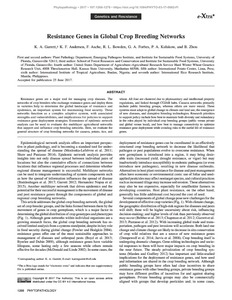Resistance genes are a major tool for managing crop diseases. The networks of crop breeders who exchange resistance genes and deploy them in varieties help to determine the global landscape of resistance and epidemics, an important system for maintaining food security. These networks function as a complex adaptive system, with associated strengths and vulnerabilities, and implications for policies to support resistance gene deployment strategies. Extensions of epidemic network analysis can be used to evaluate the multilayer agricultural networks that support and influence crop breeding networks. Here, we evaluate the general structure of crop breeding networks for cassava, potato, rice, and wheat. All four are clustered due to phytosanitary and intellectual property regulations, and linked through CGIAR hubs. Cassava networks primarily include public breeding groups, whereas others are more mixed. These systems must adapt to global change in climate and land use, the emergence of new diseases, and disruptive breeding technologies. Research priorities to support policy include how best to maintain both diversity and redundancy in the roles played by individual crop breeding groups (public versus private and global versus local), and how best to manage connectivity to optimize resistance gene deployment while avoiding risks to the useful life of resistance genes.
Resistance genes in global crop breeding networks
Citation: Garrett, K.A., Andersen, K.F., Asche, F., Bowden, R.L., Forbes, G.A., Kulakow, P.A. & Zhou, B. (2017). Resistance genes in global crop breeding networks. Phytopathology, 107(10), 1268-1278.
2017-10-25
journal_article

